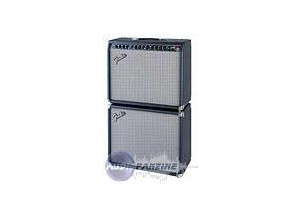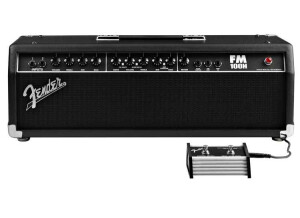Where to buy Ultralight Jazzmaster?
Less
There are no classified ads for this product.
Tech. sheet
- Manufacturer: Fender
- Model: Ultralight Jazzmaster
- Series: Jazzmaster
- Category: Solid-State Guitar Amp Heads
- Other names:ultralightjazzmaster
We have no technical specifications for this product
but your help will be much welcomed
»
User reviews
4.0/5(1 reviews)
5
4
100 %
3
2
1
Published on 05/20/07 at 07:56 (This content has been automatically translated from French)
I decided to post my opinion: long sought this type of amp, I waited in hopes of reading a review posted here!
So the head of a transistor amplifier, 250w announcement, designed to be connected to the baffle 112 dedicated Jazzmaster Enclosure (with a 12-hp jensen ' .
.
Fender's site is very well done, you will find the features easy to complete.
In summary: two separate channels, a clear (with a switch "voice", just equivalent to a bright switch), emulating a saturation, each with their controls and separate effects section. A line-out (adjustable output level and ground lift switch in case of interferences), a tuner out (with mute button to agree silently on stage), effects...…
So the head of a transistor amplifier, 250w announcement, designed to be connected to the baffle 112 dedicated Jazzmaster Enclosure (with a 12-hp jensen '
Fender's site is very well done, you will find the features easy to complete.
In summary: two separate channels, a clear (with a switch "voice", just equivalent to a bright switch), emulating a saturation, each with their controls and separate effects section. A line-out (adjustable output level and ground lift switch in case of interferences), a tuner out (with mute button to agree silently on stage), effects...…
Read more
I decided to post my opinion: long sought this type of amp, I waited in hopes of reading a review posted here!
So the head of a transistor amplifier, 250w announcement, designed to be connected to the baffle 112 dedicated Jazzmaster Enclosure (with a 12-hp jensen ' .
.
Fender's site is very well done, you will find the features easy to complete.
In summary: two separate channels, a clear (with a switch "voice", just equivalent to a bright switch), emulating a saturation, each with their controls and separate effects section. A line-out (adjustable output level and ground lift switch in case of interferences), a tuner out (with mute button to agree silently on stage), effects loop, intended particularly for the pedals, for switching effects or one of the channels.
The head is an excellent construction and discreet appearance, comfort comes with a pouch, the separate power cable and a cable Speakon to liaise with the baffle.
Everything is full of professional equipment is solid, inspiring confidence, which quickly found its mark, and is convenient to use, whether on stage or in studio. Of course it's expensive for a transistor amp (especially if you buy the set) but well worth the money. Note that I had to wait a long delay before getting the cabinet, on order only.
I wish I can be a bit more freedom on the control of effects, but it's just a flat.
UTILIZATION
Operation is very simple indeed, and it's almost "what's read the manual" which remains succinct.
Be careful with the subtlety of Speakon cable connection, there is a well studied security and then turn the cable in a sense, once inserted until a click-maintenance, and liaison.
The settings are generally very progressive and have a good effect on the frequencies. Having tested quite a head plugged into a Yamaha console (before the long awaited cabinet!) Then I have tweaked my settings when connected to the cabinet, but it's a little logic.
The effects are somewhat more difficult to measure, and it is better to stay in "homeopathic doses" otherwise it quickly becomes artificial.
As for the use of channel "saturated" I confess myself not to be hardly used, I think I spent too much time on tube amps to risk venture in such a disappointment! It can always help, but as the machine is fully suited for pedals and effects (often already owned and a higher standard), why ...?
SOUNDS
I will mainly talk about the clean channel, then, and when the head is connected to the dedicated cabinet (the optimum config):
This gives a direct sound and timbre, but recalled the loyalty of AER, but it gets faster and more easily what you will, with settings more "hot" and "mediums". As it is very sound, depending on the guitar plugged in and the game of course. But as EAR, when you have tamed the system, all the variations of the attack of the game are faithfully transcribed. What comfort! (Or what a pain if you're not in shape!) Joking aside the amp is easy to play, and that more than AER. And it does not sound so far artificial "80 years" as a Jazzchorus. After re-reading: I am a little hard on the Roland Jazzchorus is fine, just maybe a little too "locked in his style" ... The Jazzmaster I find it therefore more versatile.
It will say that the amp is designed for jazz guitar cases and other half, but with a solid-body (I have a Tom Anderson Hollow T) it works very well, and thanks to the versatility of my guitar I can go from jazz sounds great in a low tone (humbucker bass) on the instrument sounds more rock playing simple microphone or microphones mixed.
The bright switch is not so bad (do not compare with the equivalent of tube amps of the 60 editions of course!), And it may be useful in rhythm.
Once the (good) effects connected, the overall tone is observed, a vox pedal tube does wonders for a warmer sound and crunch.
The output is very effective, and I was very surprised at the quality of the sound recordings, with great presence, bass and midrange (the recording sounds a guitar can often seem sour)
OVERALL OPINION
Extremely pleased with all, and soon I would welcome again my choice when it comes to the remake "move" to play on stage: significant argument: the whole is light and compact. And no stress to risk breaking a lamp ...
I'm not very demanding on the reverb but still sees the limits. Having said that the modern effects processors of good quality (Alesis and others ...) should work better ...
So the head of a transistor amplifier, 250w announcement, designed to be connected to the baffle 112 dedicated Jazzmaster Enclosure (with a 12-hp jensen '
Fender's site is very well done, you will find the features easy to complete.
In summary: two separate channels, a clear (with a switch "voice", just equivalent to a bright switch), emulating a saturation, each with their controls and separate effects section. A line-out (adjustable output level and ground lift switch in case of interferences), a tuner out (with mute button to agree silently on stage), effects loop, intended particularly for the pedals, for switching effects or one of the channels.
The head is an excellent construction and discreet appearance, comfort comes with a pouch, the separate power cable and a cable Speakon to liaise with the baffle.
Everything is full of professional equipment is solid, inspiring confidence, which quickly found its mark, and is convenient to use, whether on stage or in studio. Of course it's expensive for a transistor amp (especially if you buy the set) but well worth the money. Note that I had to wait a long delay before getting the cabinet, on order only.
I wish I can be a bit more freedom on the control of effects, but it's just a flat.
UTILIZATION
Operation is very simple indeed, and it's almost "what's read the manual" which remains succinct.
Be careful with the subtlety of Speakon cable connection, there is a well studied security and then turn the cable in a sense, once inserted until a click-maintenance, and liaison.
The settings are generally very progressive and have a good effect on the frequencies. Having tested quite a head plugged into a Yamaha console (before the long awaited cabinet!) Then I have tweaked my settings when connected to the cabinet, but it's a little logic.
The effects are somewhat more difficult to measure, and it is better to stay in "homeopathic doses" otherwise it quickly becomes artificial.
As for the use of channel "saturated" I confess myself not to be hardly used, I think I spent too much time on tube amps to risk venture in such a disappointment! It can always help, but as the machine is fully suited for pedals and effects (often already owned and a higher standard), why ...?
SOUNDS
I will mainly talk about the clean channel, then, and when the head is connected to the dedicated cabinet (the optimum config):
This gives a direct sound and timbre, but recalled the loyalty of AER, but it gets faster and more easily what you will, with settings more "hot" and "mediums". As it is very sound, depending on the guitar plugged in and the game of course. But as EAR, when you have tamed the system, all the variations of the attack of the game are faithfully transcribed. What comfort! (Or what a pain if you're not in shape!) Joking aside the amp is easy to play, and that more than AER. And it does not sound so far artificial "80 years" as a Jazzchorus. After re-reading: I am a little hard on the Roland Jazzchorus is fine, just maybe a little too "locked in his style" ... The Jazzmaster I find it therefore more versatile.
It will say that the amp is designed for jazz guitar cases and other half, but with a solid-body (I have a Tom Anderson Hollow T) it works very well, and thanks to the versatility of my guitar I can go from jazz sounds great in a low tone (humbucker bass) on the instrument sounds more rock playing simple microphone or microphones mixed.
The bright switch is not so bad (do not compare with the equivalent of tube amps of the 60 editions of course!), And it may be useful in rhythm.
Once the (good) effects connected, the overall tone is observed, a vox pedal tube does wonders for a warmer sound and crunch.
The output is very effective, and I was very surprised at the quality of the sound recordings, with great presence, bass and midrange (the recording sounds a guitar can often seem sour)
OVERALL OPINION
Extremely pleased with all, and soon I would welcome again my choice when it comes to the remake "move" to play on stage: significant argument: the whole is light and compact. And no stress to risk breaking a lamp ...
I'm not very demanding on the reverb but still sees the limits. Having said that the modern effects processors of good quality (Alesis and others ...) should work better ...
See less
80
»
Other Fender solid-State Guitar Amp Heads
Other categories in Guitar Amp Heads
Where to buy Ultralight Jazzmaster?
Less
There are no classified ads for this product.











